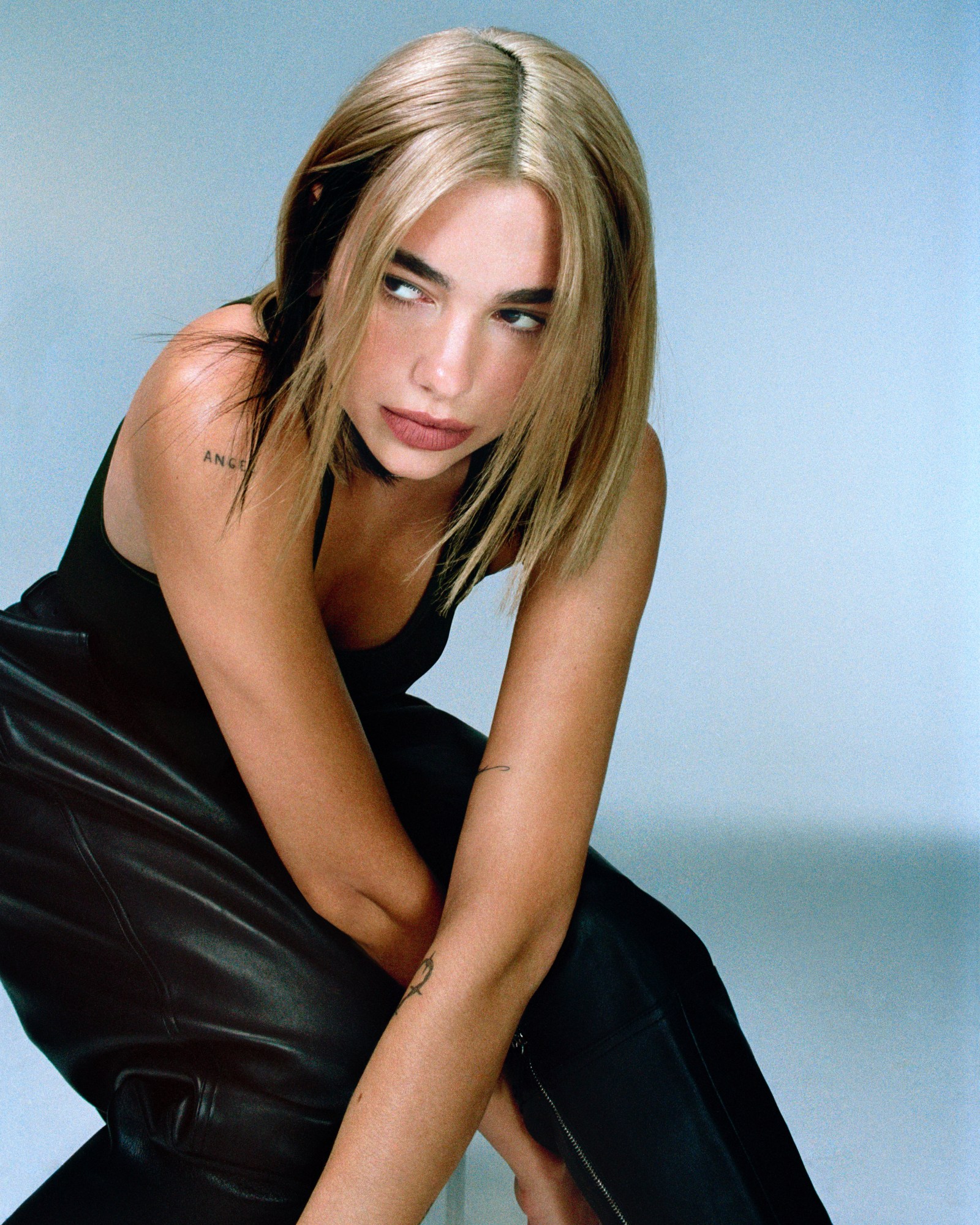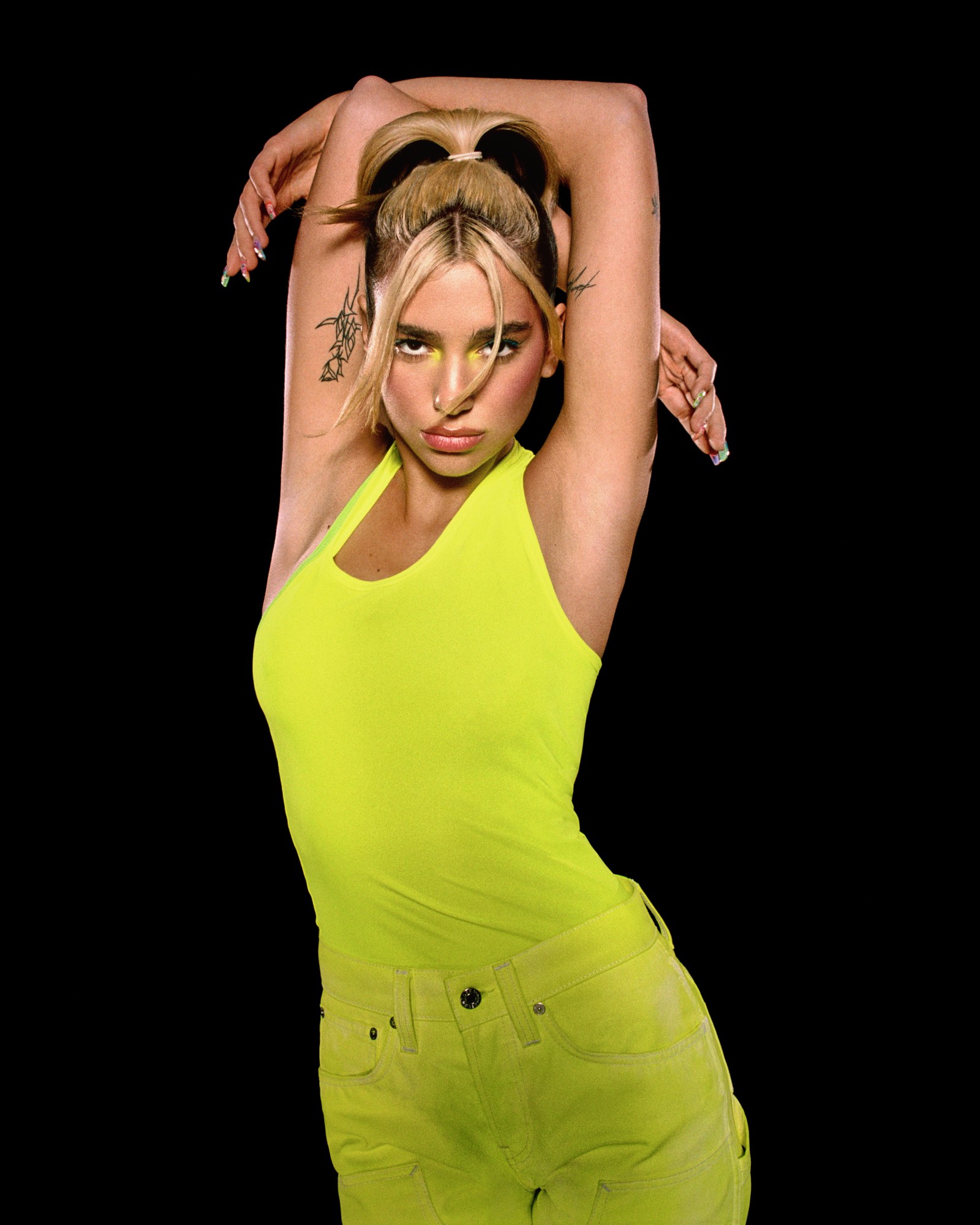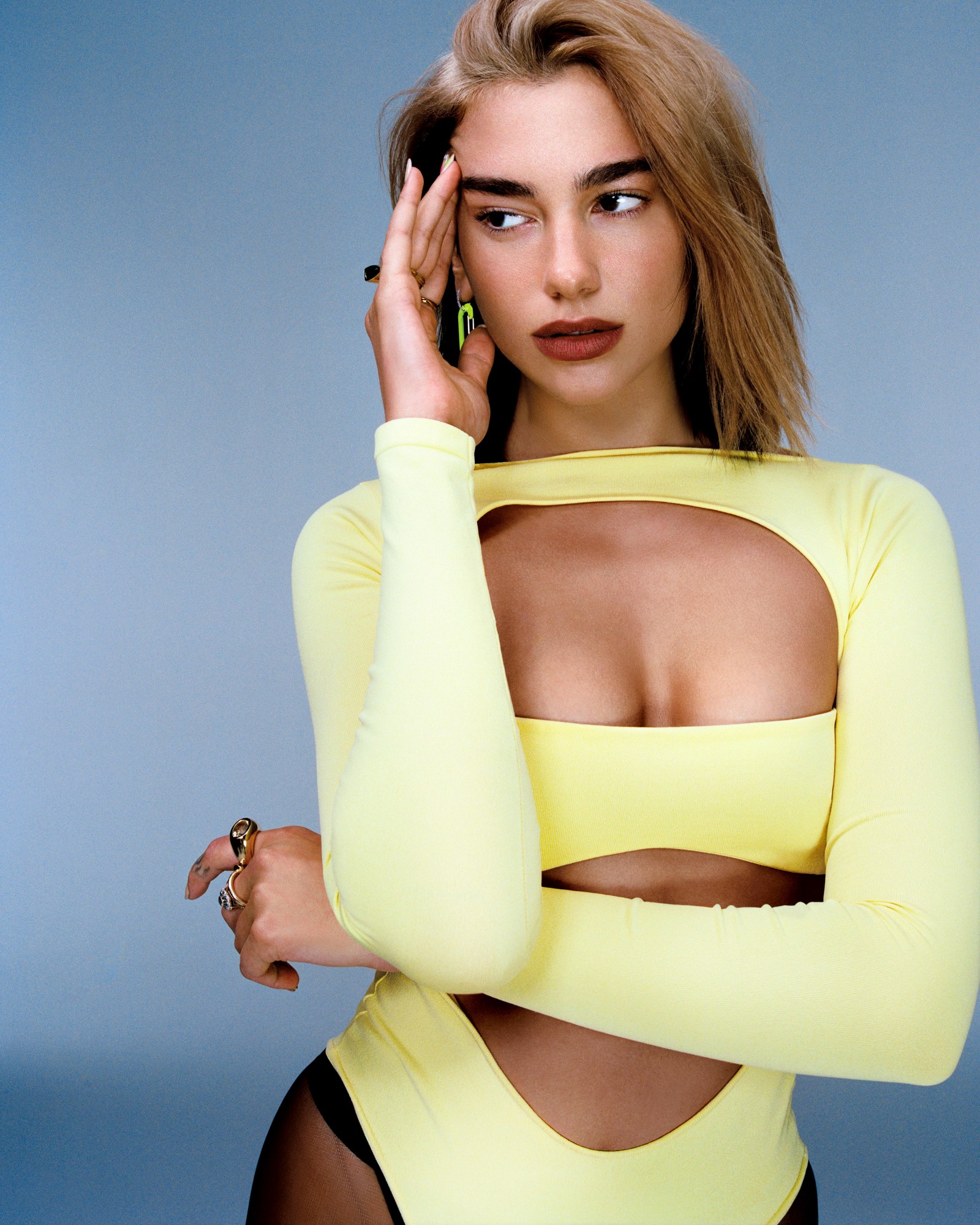Shortly before she picks up the phone, Dua Lipa makes modern music history. Last Friday, after narrowly missing out on a number one debut for her sophomore record Future Nostalgia, the Kosovo-born star, arguably the most exciting, dynamic figure in our corona-stalled pop landscape right now, ascended to the top spot in the UK album charts. She brought three singles — “Don’t Start Now”, “Physical” and “Break My Heart” — into the top 10 with her. The last British woman to achieve that holy trinity of top tier success was Dame Vera Lynn nearly 70 years ago, and even she didn’t have the number one album out at the same time. Future Nostalgia has since become the most streamed album in a single day by a British woman too. “Yeah, I’m super, super happy!” Dua says over the phone from her temporary London spot during quarantine. “It’s really exciting news. I can’t believe it’s happening.”
In modern pop terms, it’s been a long road to the top, and few of her contemporaries have shown such career resilience. It’s been almost five years since Dua self-released “New Love” the day before her 20th birthday: a heartbroken ballad cooed over skewed synths and tribal drums that was mostly ignored when it first dropped. Two years and several delays led to her self-titled debut record, teased by a number of big pop singles that, you could tell, weren’t hitting the markets her label wanted them to — but it came. 2017 was the summer of “New Rules”, and Dua Lipa’s name was everywhere. In doing so, she’d create a slow and steady path to pop stardom from her half-decade of hard work.

Look back upon the biggest women pop stars of the past two decades, and you’ll see a common thread through their success. It starts with a hit debut single that propels them to international fame, followed by a constant battle to maintain that success that, ultimately, catalyses the misogynistic discourse surrounding “flops” and failures. Dua Lipa has experienced that too, of course, but before “New Rules” happened and her world spun twice as fast, she’d been creeping into a spotlight many were blinded by immediately. It’s paid off: right now, she’s the one everybody’s watching, and she’s arrived bearing a glittering and euphoric sophomore record that’s widely considered one of the best of 2020 so far.
So here’s the star that everyone’s talking about dissecting her growth as an artist, the adoring reception for Future Nostalgia, the “Dula Peep” moniker, and what she plans to do as soon as quarantine ends.
To start, can you take us back to mid-October, when you first teased this whole new era with that “Miss me?” video. How did you feel?
It was the week before “Don’t Start Now” came out, and it was probably the most nervous I’d ever been because I’d made this whole record in my own head. When it came to getting ready to put something out, I had no idea if anybody was going to like it. This wasn’t something that was being played on the radio at the moment. It all hit me the week before, but up until then, I didn’t have any pressure on me.
After “Don’t Start Now” came out, did its success ease the pressure of what came afterwards?
I think there’s always a little anticipation before you release something because you don’t know how people are going to react to it. I put “Physical” out, and that song is so relentless and in your face that I thought some might like it but others won’t. I’d prepared for that outcome, but I was pleasantly surprised. Everybody was so supportive.
Does it feel surreal now?
I woke up pinching myself today. I feel so grateful to be able to do something like this on my second record, to feel like I was able to grow and mature as an artist and be met with open arms… I’m really grateful for that.

In many ways, you opened the doors for a bunch of young women in pop music, taking a slower ascent to the top. Major labels now feel they can wait on artists to get to your level whereas, before, it was a far more brutal chase for immediate success. Does any part of you feel like looking back on those early days to say, “I told you so?”
No, not at all! From the very beginning I was so fortunate to have a team who stood by me through the whole process, and we were all working together to create something we were really proud of. Everything felt like a step towards it — we never felt like we were taking a step back. It was either big leaps or baby steps. I didn’t want to compromise my vision and my music for anything. When it comes, it comes. I just wanted to do it on my terms.
There are very few relationships between an art director and a musician as gratifying as yours is with Hugo Comte. Whose idea was it to bring the pair of you together?
I loved his work, so I reached out and sent him some songs. We hung out in Paris as friends before we worked together because I wanted to make sure we had a friendly relationship so we could be ourselves around each other, and what better way to do that than go out? It makes everything feel less like work. In the end, I feel like I wound up working with my friend. He’s such a creative and a visionary.
And you recently jumped on a remix of “SUGAR” by Brockhampton. How did that collaboration come about?
Well, it was kind of funny. I’ve been listening to Brockhampton for quite a while and always loved their stuff. I got a text from my manager saying that they had reached out to ask if I wanted to do a remix for “SUGAR”. I said I’d loved to do something, but wanted to get into the studio and do something together.
I was in Los Angeles around Grammy time. It wasn’t the day after the Grammys, because I was hungover, but the day after that I went down to their studio to hang out. I only had a couple of hours, so I wanted to see if we got on, but we ended up writing the verse there and then. I thought, let me just live with this for a bit, and then got back to London and re-did the vocal, which is the final version on the record. It was really fun! I think they’re great and love what they’re doing… constantly putting music out and making stuff.
I wanted to ask about an Instagram story you posted a few months ago, tied to the mispronunciation of your name and the xenophobic baggage of it. A lot of people took that as a reference to [Dula Peep], the name Wendy Williams dreamt up for you. It’s one that fans, particularly queer ones, are overzealous users of. Does it upset you?
It doesn’t upset me. I think it’s funny at times when it’s said in an endearing way, and you can tell when people are using it in an endearing way — but a lot of people try and use it negatively or on purpose, which takes the fun and jokiness out of it. That’s fine, it’s obviously extremely childish. But I’m completely fine. And if you can’t laugh at yourself, that’s a problem! You should always be able to see things in a lighter way.

Your life has been crazy for the past three years now, but Future Nostalgia ’s biggest success has come while we’ve all been trapped indoors. Is it strange, becoming one of the world’s biggest pop stars without any face-to-face interaction?
It’s been interesting. It’s not the way I’d envisioned promoting my record, but I’m so grateful because it’s given me so many personal connections, I guess. Even with the live streams, which is something totally out of my comfort zone. Sitting in front of a camera and talking to an audience without seeing them has taught me how to articulate things better. I don’t know… I feel like this time has opened us all up to having more meaningful conversations. Closeness.
What do you miss most about the outside world?
Travelling. I love that part of my job, getting to go to different studios and put on performances. Human interaction too. I miss being able to hang out in big groups with my friends, and have dinner and drink and dance. There’s so much about that that I miss. Going to pubs and having roasts, and being around lots of people. Noise.
Do you know what you’ll do as soon as this blows over?
I’m not sure! Definitely see my friends, all together in a massive group for a belated album launch. Then I think my boyfriend and I will head to New York. We were meant to pack up our flat there, but because of Corona we couldn’t do that.
At what point did you realise that your platform could be used for something greater?
I always wanted to do something like that. In the beginning, that was wanting to do something back home in Kosovo, mainly because of the support they’ve given me. My parents struggled a lot and have been through oppression, after living in Kosovo too, and after learning what happened during the war, I knew I had to give back. But with my platform, I’m allowed to speak up on things that I’m passionate about. Working with Unicef was a no brainer for me, [with them I’m] focussing on the refugee crisis.
I just want to use this platform to support people that need me, and people that have been supporting me. People like me that need opportunities that I’m so lucky to have had. I want to be able to share that with other people: to try and make those possibilities a reality for another young girl or boy wherever they may be in the world.
Future Nostalgia is out now and, fucking hell, what an album it is!
Credits
Photography Hugo Comte
